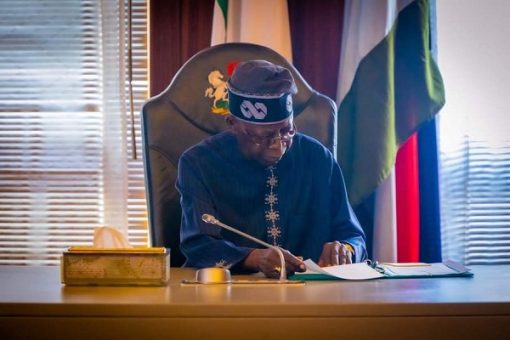The federal government on Wednesday, October 16, launched its N10 billion consumer credit for Nigerians to buy Compressed Natural Gas (CNG) conversion kits and solar energy panels.
The loan which is tagged “Credit Access for Light and Mobility (CALM), is targeted to “calm things down.”
It is designed to mitigate the impact of Premium Motor Spirit (PMS) subsidy removal on consumers who are now grappling with transport fare hikes.
The Ministry of Finance Incorporated (MOFI), Credit Corporation (CREDICORP), and Presidential Compressed Natural Gas Initiative (PI-CNG) signed to launch the CALM Fund in Abuja.
The loan, which has a 15 percent to 20 percent interest rate is accessible through existing Participating Financial Institutions (PFI) in the country.
Speaking at the ceremony, MOFI, Chief Executive Officer, Mr. Armstrong Ume Takang, “In response to the growing financial strain on Nigerians due to high energy and transportation costs, Ministry of Finance Incorporated (MOFI), CREDICORP, (Nigerian Consumer Credit Corporation), and the Presidential Initiative on CNG (PI-CNG) Ltd have joined forces to launch the Credit Access for Light and Mobility (CALM) Fund.
“This new fund aims to provide affordable credit for Nigerians to obtain CNG conversion kits and other energy-saving solutions, making essential services more accessible to Nigerians while promoting sustainability.”
He said the CALM Fund offers a lifeline to households and businesses seeking practical ways to manage their high transportation and energy costs. Through flexible financing options, Nigerians will be able to obtain immediate credit to convert their vehicles to CNG and adopt solar energy solutions—reducing dependency on expensive fuels and lowering electricity bills.
Similarly, the CrediCorp, Managing Director, Mr. Uzoma Nwagba said N2.5 billion of the N10 billion loan is readily available for access. He added that it is expected to grow with time.
“So this fund can grow as much as the demand. Obviously, as more demand grows, the fund will be growing. We are having an initial fund of 10 billion Naira with a of 2.5 that is available even from today,” he said.
Nwagba said that what makes one eligible for the loan is to have a verifiable income through which the financial institutions can assess them for the loan.
On the interest rate, he said “We have a high interest rate environment now. So we are giving up to 15% to 20% discount per annum on the interest rates that the financial institutions currently serve people.”
He added that it is all a factor of the beneficiary’s loanworthiness.
Nwagba further noted that the Consumer Credit is for all partnering with the P-CNGI to launch access for private individuals to consumer credits to afford the conversion and the cost of conversion is already quite elevated due to current realities.
He added that the Consumer credit will also be extended to encourage the manufacturing of the kits and solar panels in Nigeria instead of depending on importation.
He said it is designed to attract investments.
Continuing, he said: “But I can assure you that this particular program will not just deliver consumer credits to Nigerians, but will also encourage these products to be made, and will drive job creation as well as lower energy for Nigerians.”
Meanwhile, P-CNGI, Chief Executive Engr. Michael Oluwagbemi revealed that the programme will lead to the conversion of additional 500,000 vehicles.
He said only 1.5 million vehicles are involved in commercial transport, conveying 90% of Nigerians.
According to him, the bulk of the vehicles in the country are for private use.
“I can imagine that an additional 500,000 to a million additional vehicles will be converted because of this program. If you recall, even though 1 million to 1.5 million vehicles constitute the commercial vehicle sector and move 90% of Nigerians, the bulk of vehicles actually are in private hands. They just move less number of people,” he said.
Oluwagbemi said CNG is a cheaper and cleaner fuel, stressing “Instead of using imported petroleum, as the case may be, now we will be converting more vehicles that will be using Nigeria’s natural gas, creating jobs for Nigeria, and enabling the economy. And over the long term, supporting manufacturing, which is very dear to the heart of Mr. President in terms of job creation.”

